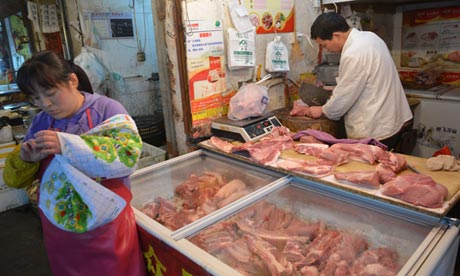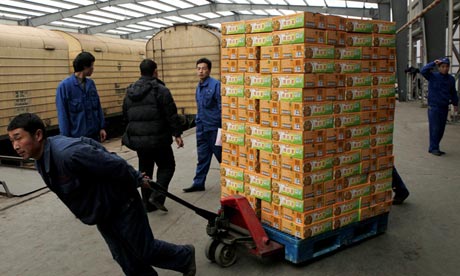Chinese Smithfield takeover comes with added warnings for US food safety
The US is increasingly reliant on food from China – but the takeover of America's largest pork producer by the Chinese meat giant Shuanghui has many food safety experts worried

Shuanghui's takeover of Smithfield would be the biggest Chinese buyout of a US company to date. Photograph: Peter Parks/AFP/Getty Images
Earlier this month, the House of Representatives committee on foreign affairs held a blistering hearing on "the threat of China's unsafe consumables" that one would have thought would have put any politician off his lunch.
Experts lined up to attack food safety standards in China, lambasting the country's record and warning of the increasing dangers to US consumers.
"Inserting the words 'China food safety' into the internet leads to over 155m hits – none of them laudatory so far as a brief examination can tell," William Triplett, author and consultant and former chief Republican counsel on the Senate committee on foreign relations warned.
The timing could hardly have been more awkward. On Wednesday, just a few weeks after the hearing, Chinese meat giant Shuanghui agreed a huge takeover deal for Smithfield, America's largest pork producer. The deal, which if approved by Congress would be the biggest Chinese buyout of a US company to date, has raised serious questions about the implications for the US food supply.
Triplett's testimony, and that of other experts, will be closely examined in Washington over the coming weeks as politicians decide whether or not to weigh in on the bid. Other takeovers have been blocked on security grounds, but so far food does not seem to constitute a national security issue as far as Washington is concerned.
That may be about to change, according to another critic at the hearing: lobby group Food & Water Watch. As the group pointed out earlier this month the US is increasingly reliant on imported food, and, increasingly, that food comes from China. According to the government accountability office (GAO), the percentage of imported food consumed in the US almost doubled from 9% to 16% between 2000 and 2011. China is the world's leading supplier of many of the staple elements of the US diet including apples, pears, potatoes and peas.
Food & Water Watch has started an online campaign to block the Smithfield deal and is calling for congressional hearings. Wenonah Hauter, executive director of Food & Water Watch, told the Guardian the deal was worrying in itself, but warned that it could be the thin end of the wedge and could lead to Chinese firms taking over large parts of the US food industry.
"Smithfield itself does not have a good record in the US. It has been associated with some of the largest fines under the Clean Water Act," she said. "And we know there have been major problems with Shuanghui in China. It doesn't seem to me like a great combination for US consumers."
China itself is subject to a seemingly endless series of food horror stories. Recently Chinese authorities found enterprising meat traders had been creating "mutton" out of rat, fox and mink flesh doused in gelatin and red colouring. Earlier this year, 16,000 dead pigs were found floating in tributaries of the Shanghai's Huangpu river, a source of tap water. Before the 2008 Olympics China was rocked by a scandal when hundreds of thousands of babies took ill, and six reportedly died, after drinking contaminated infant formula.
The US has already suffered a widespread, fatal food poisoning that can be clearly traced back to China – only the victims were pets. In 2007 the Food and Drug Administration (FDA) received reports that several thousand cats and dogs had died and thousands more became ill after eating contaminated cat food. The outbreak was traced to wheat gluten imported from China that had been mixed with melamine, a chemical compound. Melamine is one of the principal ingredients in Formica, it is also a food adulterers favored additive when they want to bulk up an item's apparent protein content.
The pet deaths caused widespread outrage and triggered a congressional hearing, but the problem did not stop there. Some of the contaminated pet food ended up in hog and chicken farms and hence on supermarket shelves.
In April the FDA asked for $10bn to increase the number of inspections it makes of Chinese food imports. But after years of savage cuts the FDA seems overwhelmed. Given the budget fight now raging on in Washington, that situation is unlikely to improve any time soon.
Triplett told Congress last month that the regulator inspects just 1%-2% of China's imports. "I don't think there is anywhere near enough taxpayer's money to play whack-a-mole with the Chinese toxic exporters around the Pacific that would make any real difference," he warned and called for the Chinese to clean up their own act.
 China is the world's leading supplier of many of the staple elements of the US diet, including apples, pears, potatoes and peas. Photograph: AP
China is the world's leading supplier of many of the staple elements of the US diet, including apples, pears, potatoes and peas. Photograph: AP
Ironically, the Smithfield deal may have been encouraged by its decision to deal with an additive issue that had Chinese consumers worried. For more than a decade US hog farmers have been putting an additive called ractopamine into pig feed to produce lean meat. Concern has been mounting about the effect of ractopamine on humans. In March China began requiring third-party verification that US pork products were ractopamine-free. Russia too, the sixth-largest buyer of US pork, has blocked imports of meat using ractopamine.
Smithfield intends to make half its enormous swine herd ractopamine-free even though the FDA still stands by its decision that the chemical is safe. A made-in-the-USA stamp has value in China where consumers are demanding safer food. That cache is worth protecting.
For critics this too is proof of China's influence on US food production. Future developments may not be as benign.
Pressure to cuts prices has already made hog production an even dirtier business, said Hauter. It is difficult for farmers to make a profit these days unless they have at least 2,000 pigs, she said. "There are counties in North Carolina that produce more waste than New York City," she said.
That pressure on prices is likely to grow alongside rising demand in China. China is already the world's largest consumer of pork. Per-capita pork consumption last year was 86lbs, up from 70lbs in 2002, according to Northstar Commodity Investment. In the US pork consumption was 58lbs last year, down from 66lbs in 2002.
"When you have increasing pressure to bring down prices, a lot of shortcuts are taken," said Hauter. "They are denying this now but ultimately I think production will move to China." China is currently banned from exporting poultry to the US but is pressing for that to be reversed.
The Smithfield deals comes at a sensitive tome for Chinese-American relations. President Obama meets Chinese leader Xi Jinping in California next week. The two countries have clashed over alleges cyber-attacks and trade spats. It remains to be seen whether Obama wants to put food on the table, so to speak.
But if the backlash against the Smithfield deals grows, he may have no choice. "A few years from now you could see an enormous increase in the amount of food we take from China," said Hauter. "I think if you ask them, the average American will be very concerned about that."

No comments:
Post a Comment
Comments always welcome!